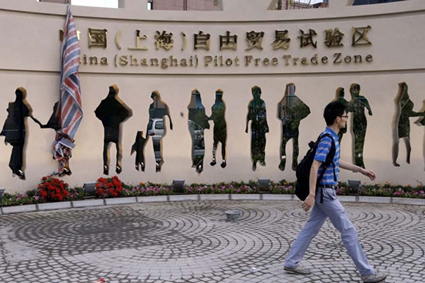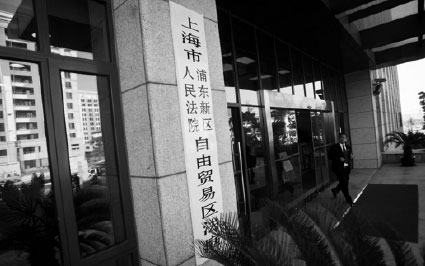Shanghai FTZ pushes ahead with legal service innovation

The
name plate of the China (Shanghai) Pilot Free Trade Zone on a gate of the
Waigaoqiao free trade zone in Shanghai. [Zhao Yun/For China
Daily]
The Pudong New Area Judicial Bureau has made a number of innovations in its quest to provide quality and efficient legal services and create a sound legal business environment since the establishment of the China (Shanghai) Pilot Free Trade Zone, the first of its kind in China, in September 2013.
Over the past six years, the bureau has overcome various obstacles and detailed many of its legal service experiences to serve as an example.
At the 10th Lujiazui Rule of Law Forum, which was held on Nov 14, 2018, more than 300 representatives from government agencies, legal professions and economic and business circles gathered to discuss how to create a fair and transparent legal business environment through legal services.
Initiated in 2009, the forum has a different theme each year and has provided a rich theoretical basis for the development of legal services and a strong legal environment.
"The development of legal services in the free trade zone cannot be achieved without sound theoretical and institutional support," said Zhang Yue, deputy director of the Notary Public Department of the Pudong New Area Justice Bureau.

The tribunal of Shanghai Free Trade Zone was founded in 2013 as a judicial safeguard in the FTZ. Yang Shenlai / For China Daily
As early as the establishment of the Shanghai FTZ, the bureau began to sort out the laws and regulations to govern the free trade zone.
In March 2014, the Chinese and English bilingual editions of the China (Shanghai) Pilot Free Trade Zone Law, Regulation and Policy Compilation were published, containing all existing laws and regulations related to business in Shanghai FTZ.
"Legal guarantee is achieved by giving priority to theory. The compilation provides a comprehensive description of all relevant policies and regulations of the free trade zone. It has become the guide for creating a strong legal service system in the free trade zone," said Huang Aiwu, deputy director of the judicial bureau.
The Shanghai Hansheng Law Offices located in Pudong New Area have 93 partners and 13 employed lawyers. Unlike other law firms, Hansheng is a merger of four small law firms. The development of law firms like Hansheng cannot be separated from the concern and guidance of the judicial bureau.
"Our research found that some small and medium-sized law firms in the free trade zone have encountered problems with business shrinkage and brain drain," said Liu Longbao, deputy director of the judicial bureau, "We are helping small and medium-sized law firms that have the desire to transform, and those facing difficulties in seeking breakthroughs, to connect with each other, negotiate mergers and realize large-scale development."
In order to help law firms avoid difficulties in the free trade zone, the bureau has adopted a grid management method to help it tend to the needs of the firms.
Zhang said that in the past five years, a total of 20 small law firms and a group of lawyers have realized the scale transformation through merger and reorganization, which not only solved the survival crisis of small law firms, but also brought many outstanding lawyers and legal services to Pudong New Area.
"We will integrate scattered and weak legal resources, proving that it's always better to work together than to work alone," Liu said.
"As the free trade zone bears the burden of economic development and international exchange, it has higher requirements for the quality of legal services. Therefore, there must be a fast and efficient legal service quality supervision method," Zhang added.
In the past, the judicial bureau's supervision of legal services was based on complaints from companies. In order to realize timely supervision and management, the bureau has begun to cooperate with third parties to explore and establish a legal service credit supervision platform.
The platform is connected with courts, tax authorities, industry, commerce and other judicial and administrative departments. It is capable of recognizing lawyer malpractice and dealing with it according to the severity of the offense.
The platform has completed development and will be put into use soon. Upon its launch, the platform will offer various legal services such as notarization, mediation and judicial appraisal.
 Contact Us
Contact Us

 Pudong lights up city with spectacular shows and cultural marvels
Pudong lights up city with spectacular shows and cultural marvels Brilliant light show to illuminate Huangpu River
Brilliant light show to illuminate Huangpu River Maple leaves paint splendid scenery in Pudong
Maple leaves paint splendid scenery in Pudong Appreciate alluring lotus blossoms in Pudong's Century Park
Appreciate alluring lotus blossoms in Pudong's Century Park


